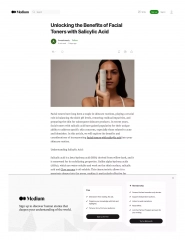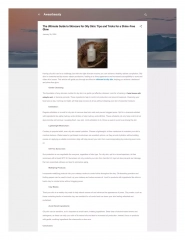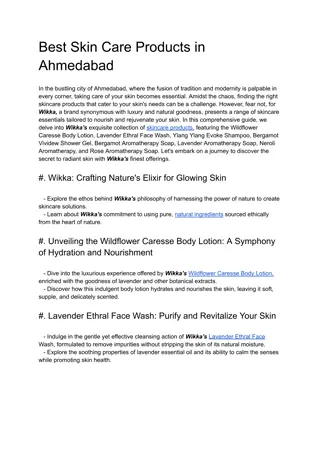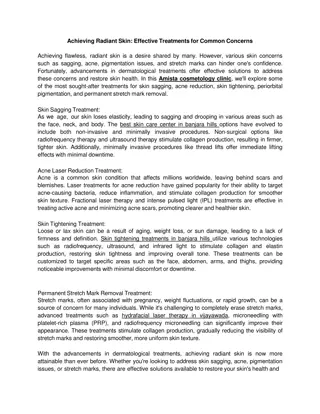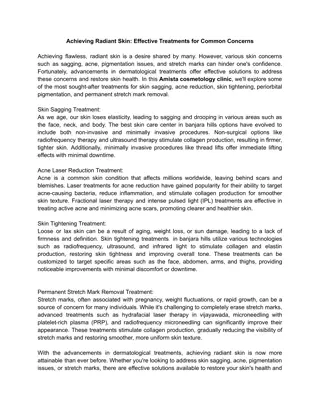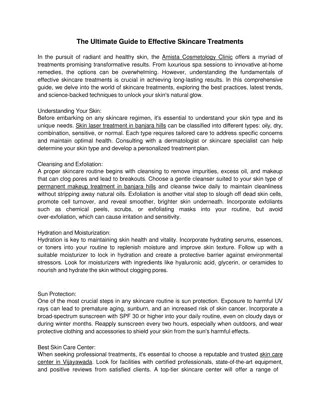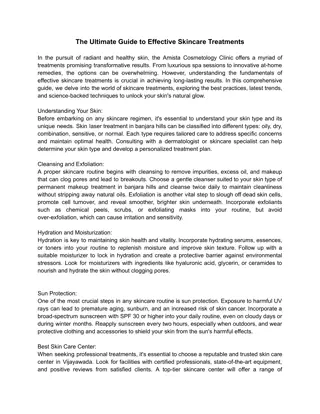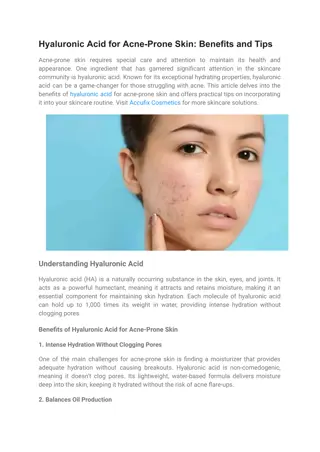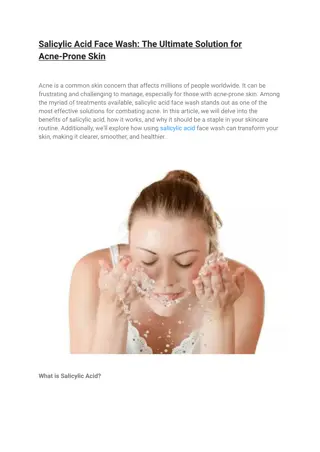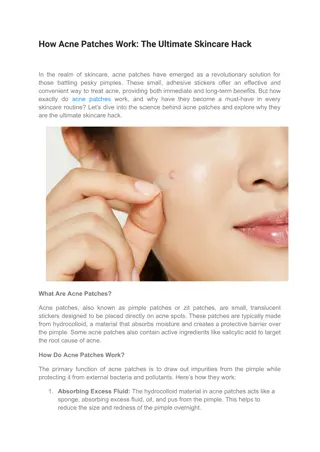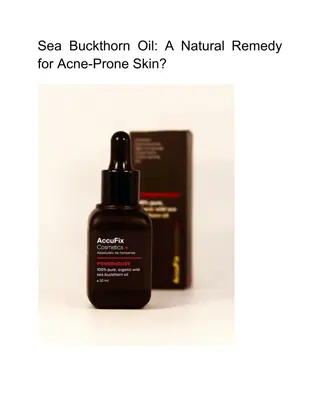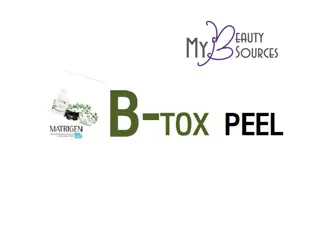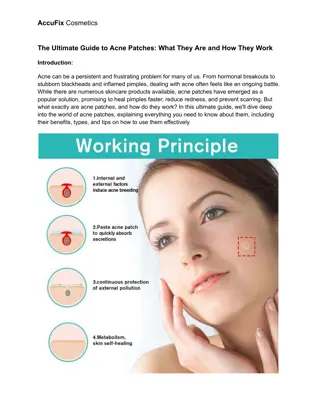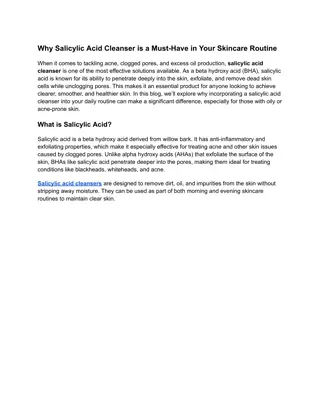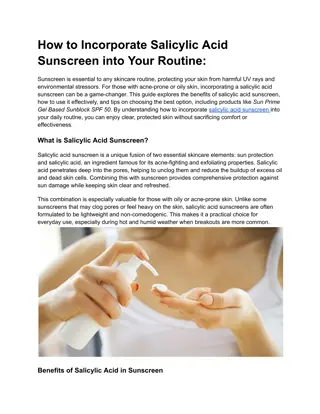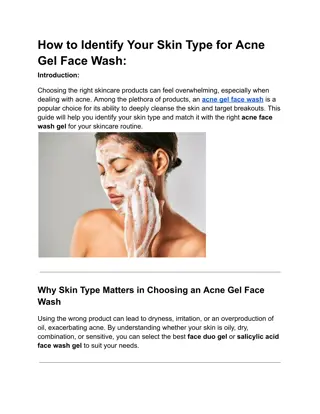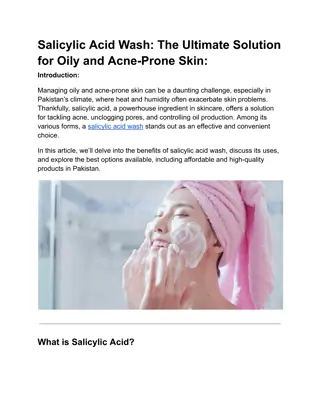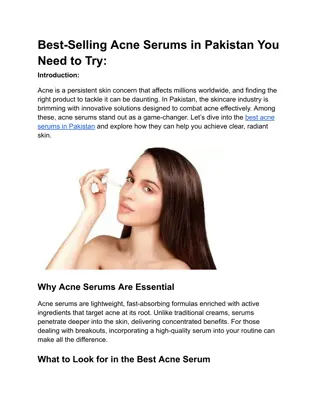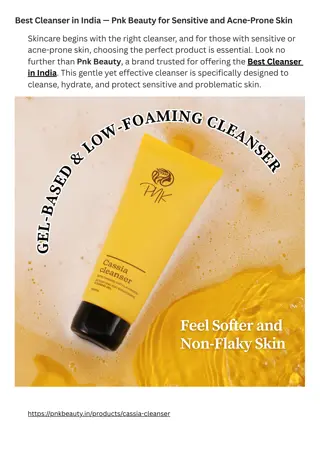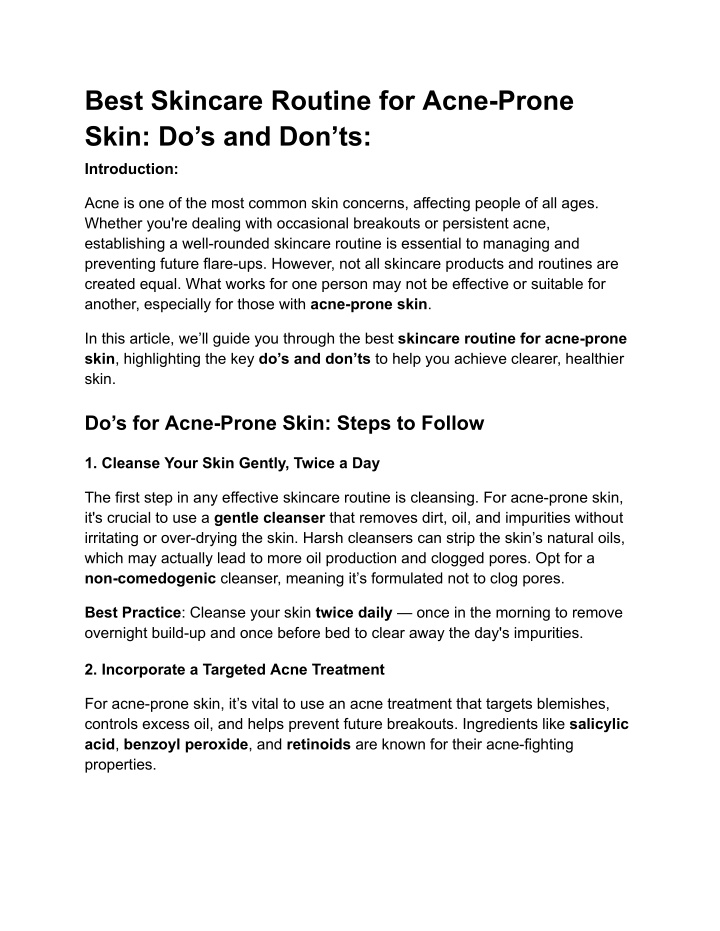
Best Skincare Routine for Acne Prone Skin Do’s and Don’ts
Acne is one of the most common skin concerns, affecting people of all ages. Whether you're dealing with occasional breakouts or persistent acne, establishing a well-rounded skincare routine is essential to managing and preventing future flare-ups.
Download Presentation

Please find below an Image/Link to download the presentation.
The content on the website is provided AS IS for your information and personal use only. It may not be sold, licensed, or shared on other websites without obtaining consent from the author. If you encounter any issues during the download, it is possible that the publisher has removed the file from their server.
You are allowed to download the files provided on this website for personal or commercial use, subject to the condition that they are used lawfully. All files are the property of their respective owners.
The content on the website is provided AS IS for your information and personal use only. It may not be sold, licensed, or shared on other websites without obtaining consent from the author.
E N D
Presentation Transcript
Best Skincare Routine for Acne-Prone Skin: Do s and Don ts: Introduction: Acne is one of the most common skin concerns, affecting people of all ages. Whether you're dealing with occasional breakouts or persistent acne, establishing a well-rounded skincare routine is essential to managing and preventing future flare-ups. However, not all skincare products and routines are created equal. What works for one person may not be effective or suitable for another, especially for those with acne-prone skin. In this article, we ll guide you through the best skincare routine for acne-prone skin, highlighting the key do s and don ts to help you achieve clearer, healthier skin. Do s for Acne-Prone Skin: Steps to Follow 1. Cleanse Your Skin Gently, Twice a Day The first step in any effective skincare routine is cleansing. For acne-prone skin, it's crucial to use a gentle cleanser that removes dirt, oil, and impurities without irritating or over-drying the skin. Harsh cleansers can strip the skin s natural oils, which may actually lead to more oil production and clogged pores. Opt for a non-comedogenic cleanser, meaning it s formulated not to clog pores. Best Practice: Cleanse your skin twice daily once in the morning to remove overnight build-up and once before bed to clear away the day's impurities. 2. Incorporate a Targeted Acne Treatment For acne-prone skin, it s vital to use an acne treatment that targets blemishes, controls excess oil, and helps prevent future breakouts. Ingredients like salicylic acid, benzoyl peroxide, and retinoids are known for their acne-fighting properties.
Salicylic Acid: A beta hydroxy acid (BHA) that penetrates pores, removing dead skin cells and preventing blockages. Benzoyl Peroxide: Known for its ability to kill acne-causing bacteria and reduce inflammation. Retinoids: Help speed up cell turnover, preventing clogged pores and promoting smoother skin. Best Practice: Apply your acne treatment after cleansing and before moisturizing, targeting areas where breakouts tend to occur. Be sure to start slow with strong active ingredients to avoid irritation. 3. Moisturize Regularly, Even If Your Skin is Oily Even if you have oily or acne-prone skin, it s important to moisturize. Using the right moisturizer helps maintain the skin s hydration balance and supports its natural barrier. Choose oil-free, non-comedogenic moisturizers that hydrate without clogging pores or exacerbating breakouts. Best Practice: Use a lightweight, gel-based moisturizer or one formulated specifically for oily, acne-prone skin. Look for ingredients like glycerin or hyaluronic acid, which hydrate without adding excess oil. 4. Wear Sunscreen Every Day Sunscreen is a must for every skincare routine, especially for acne-prone skin. Some acne treatments, such as retinoids and salicylic acid, can make your skin more sensitive to the sun, increasing the risk of sunburn and hyperpigmentation. Additionally, unprotected sun exposure can worsen acne scars. Best Practice: Apply a broad-spectrum sunscreen with an SPF of at least 30 every morning, even if you're staying indoors. Look for oil-free, non-comedogenic sunscreens to prevent clogged pores. 5. Be Consistent, But Patient
When it comes to managing acne, consistency is key. Stick to your skincare routine for at least a few weeks before evaluating its effectiveness. Acne treatments often take time to show results, and switching products too frequently can irritate the skin and make things worse. Best Practice: Follow your routine every day, morning and night, and be patient. While it may take a few weeks, you should start to see improvement in your skin. Don ts for Acne-Prone Skin: Mistakes to Avoid 1. Don t Over-Cleanse Your Skin While cleansing is essential, over-cleansing can worsen acne. Scrubbing or washing your face too often strips away essential oils, leaving your skin vulnerable and irritated. This can trigger an overproduction of oil, leading to more breakouts. Worst Practice: Avoid washing your face more than twice a day. Over-cleansing can also lead to a compromised skin barrier, making your skin more sensitive and prone to irritation. 2. Don t Pick or Squeeze Pimples It can be tempting, but picking at your pimples or blackheads can lead to scarring and infection. Picking at acne can push bacteria deeper into the skin, worsening the situation and increasing inflammation. Additionally, this can result in post-inflammatory hyperpigmentation, which leads to stubborn dark spots. Worst Practice: Resist the urge to pick at your pimples. Instead, use spot treatments and allow blemishes to heal naturally. 3. Don t Use Harsh Exfoliants Exfoliation can help remove dead skin cells and prevent clogged pores, but over-exfoliating or using harsh physical exfoliants can damage the skin and worsen acne. Rough scrubs can create microtears in the skin, increasing irritation and causing inflammation.
Worst Practice: Avoid using abrasive scrubs, especially on active breakouts. Stick to gentle chemical exfoliants like salicylic acid or lactic acid, which exfoliate without causing harm to the skin. 4. Don t Skip the Moisturizer It s a common misconception that acne-prone skin doesn t need moisturizing. However, skipping this step can lead to dryness and irritation, which in turn can cause your skin to overproduce oil. This creates a cycle of excess oil and more breakouts. Worst Practice: Never skip moisturizing, even if your skin is oily. Choose a lightweight, non-comedogenic moisturizer to hydrate your skin without clogging your pores. 5. Don t Overuse Acne-Fighting Products While it s essential to use acne treatments, overusing them can irritate and dry out your skin. Using multiple acne-fighting products in one routine may cause sensitivity, leading to redness and peeling. More isn t always better when it comes to acne treatments. Worst Practice: Use acne products as directed and avoid layering too many acne treatments on top of each other. Start with one key treatment and gradually add others if necessary. Best Skincare Products for Acne-Prone Skin 1. Cleanser: Cetaphil Daily Facial Cleanser Cetaphil is a gentle, non-comedogenic cleanser that effectively removes dirt and oil without irritating sensitive, acne-prone skin. It s fragrance-free and ideal for daily use. 2. Acne Treatment: The Ordinary Niacinamide 10% + Zinc 1% Niacinamide is a powerful ingredient that helps control oil production and reduce the appearance of pores. It s excellent for preventing acne flare-ups without drying the skin.
3. Moisturizer: Neutrogena Hydro Boost Water Gel This lightweight moisturizer hydrates the skin without clogging pores. It's oil-free and contains hyaluronic acid, which helps maintain moisture balance in acne-prone skin. 4. Sunscreen: La Roche-Posay Anthelios Clear Skin SPF 60 A broad-spectrum sunscreen designed specifically for acne-prone skin. It s lightweight, oil-free, and provides a matte finish, making it perfect for oily skin types. Conclusion Creating the best skincare routine for acne-prone skin requires a balance of the right ingredients, consistent use, and patience. By focusing on gentle cleansing, effective acne treatments, and proper hydration, you can keep your skin clear and healthy. Avoiding over-exfoliation, harsh products, and picking at your acne will prevent further irritation and breakouts. Remember, consistency is the key. Stick with your routine and adjust it as necessary, and you ll be on your way to clearer skin in no time.

